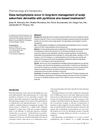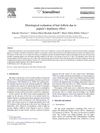 17 citations,
January 2010 in “PubMed”
17 citations,
January 2010 in “PubMed” Optimal storage solutions and effective additives are crucial for improving the survival of hair transplant grafts.
 16 citations,
March 2018 in “Plastic and Reconstructive Surgery – Global Open”
16 citations,
March 2018 in “Plastic and Reconstructive Surgery – Global Open” Early surgical treatment for severe facial injuries from high-energy impacts leads to better recovery.
 16 citations,
August 2014 in “Colloids and surfaces. B, Biointerfaces”
16 citations,
August 2014 in “Colloids and surfaces. B, Biointerfaces” Lipid-coated silica nanoparticles penetrate human skin more deeply than bare silica nanoparticles.
 16 citations,
December 2008 in “International Journal of Dermatology”
16 citations,
December 2008 in “International Journal of Dermatology” Long-term use of pyrithione zinc shampoos remains effective for scalp seborrheic dermatitis, with decreased effectiveness likely due to not following treatment instructions rather than the treatment itself.
 15 citations,
May 2011 in “Veterinary Dermatology”
15 citations,
May 2011 in “Veterinary Dermatology” Vitamin A might be a safe extra treatment for dogs with sebaceous adenitis, but more research is needed to prove its effectiveness.
 15 citations,
December 2007 in “Dermatologic Therapy”
15 citations,
December 2007 in “Dermatologic Therapy” Hair transplantation has improved with techniques that increase graft survival and patient satisfaction for more natural results.
 14 citations,
June 2021 in “British journal of dermatology/British journal of dermatology, Supplement”
14 citations,
June 2021 in “British journal of dermatology/British journal of dermatology, Supplement” Experts agreed on guidelines to improve research on Frontal Fibrosing Alopecia.
 14 citations,
October 2012 in “Clinics in Plastic Surgery”
14 citations,
October 2012 in “Clinics in Plastic Surgery” Adding stem cells to fat grafts for facial rejuvenation might improve outcomes, but more research is needed to confirm safety and effectiveness.
 14 citations,
January 2008 in “Gene therapy”
14 citations,
January 2008 in “Gene therapy” Gene therapy shows promise for enhancing physical traits but faces ethical, safety, and regulatory challenges.
 13 citations,
September 2020 in “Dermatologic Therapy”
13 citations,
September 2020 in “Dermatologic Therapy” Microneedling may help hair loss, but needs more research.
 13 citations,
January 2007 in “International journal of pharmaceutics”
13 citations,
January 2007 in “International journal of pharmaceutics” Papain cream removes hair better than papain gel, causing hair follicles to widen and skin to thicken.
 12 citations,
May 2005 in “Current obstetrics and gynaecology/Current obstetrics & gynaecology”
12 citations,
May 2005 in “Current obstetrics and gynaecology/Current obstetrics & gynaecology” Hirsutism is too much hair growth in women like the pattern in men, often caused by high male hormones, and can be treated with hormone control and hair removal methods.
 11 citations,
May 2021 in “Dermatologic clinics”
11 citations,
May 2021 in “Dermatologic clinics” PRP and cell therapies may help with hair loss, but more research is needed.
 11 citations,
August 2020 in “Dermatologic therapy”
11 citations,
August 2020 in “Dermatologic therapy” The document concludes that mesotherapy can be effective for skin and hair treatments, but more research is needed to confirm its safety and effectiveness.
 11 citations,
May 2019 in “BioMed Research International”
11 citations,
May 2019 in “BioMed Research International” Hair transplantation effectively treats scalp scars with high success and patient satisfaction.
 10 citations,
January 2018 in “Seminars in Reproductive Medicine”
10 citations,
January 2018 in “Seminars in Reproductive Medicine” The document concludes that women with PCOS need a comprehensive care model that covers reproductive, metabolic, and psychological health to improve their quality of life.
 10 citations,
January 2013 in “Journal of Cutaneous and Aesthetic Surgery”
10 citations,
January 2013 in “Journal of Cutaneous and Aesthetic Surgery” Narrower donor strips and special closure techniques in hair transplants lead to smaller scars and happier patients.
 9 citations,
May 2015 in “Cardiology Clinics”
9 citations,
May 2015 in “Cardiology Clinics” The conclusion is that managing cholesterol is important for women, especially during pregnancy, breastfeeding, and with PCOS, and involves regular screening and careful treatment choices.
 9 citations,
December 2014 in “Neuropsychiatric Disease and Treatment”
9 citations,
December 2014 in “Neuropsychiatric Disease and Treatment” People with first-time vitiligo have lower levels of a certain brain protein compared to healthy individuals.
 9 citations,
March 2001 in “Clinics in dermatology”
9 citations,
March 2001 in “Clinics in dermatology” Hirsutism in women is often due to hormone sensitivity and has significant psychological effects.
 7 citations,
August 1989 in “The Journal of Dermatologic Surgery and Oncology”
7 citations,
August 1989 in “The Journal of Dermatologic Surgery and Oncology” Facelifts can lead to high patient satisfaction and a quick recovery when done correctly.
 6 citations,
July 2018 in “JAMA facial plastic surgery”
6 citations,
July 2018 in “JAMA facial plastic surgery” Injecting minced fat into the facial artery can cause severe eye problems and death, more so than other fat types, and larger amounts increase these risks.
 5 citations,
January 2014 in “BioMed Research International”
5 citations,
January 2014 in “BioMed Research International” Hormonal status significantly affects women's skin health throughout their lives.
 5 citations,
October 2013 in “Clinics in Plastic Surgery”
5 citations,
October 2013 in “Clinics in Plastic Surgery” Hair transplant improves with regenerative medicine and FUE technique.
 5 citations,
February 2011 in “Expert Opinion on Drug Discovery”
5 citations,
February 2011 in “Expert Opinion on Drug Discovery” We need better treatments for hair loss, and while test-tube methods are helpful, they can't fully replace animal tests for evaluating new hair growth treatments.
 4 citations,
January 2021 in “Skin appendage disorders”
4 citations,
January 2021 in “Skin appendage disorders” Washing hair daily is better and preferred, with no negative effects.
 3 citations,
January 2019 in “Skin Research and Technology”
3 citations,
January 2019 in “Skin Research and Technology” Frequent use of hair straighteners can cause hair loss similar to scarring alopecia in young Turkish women.
 3 citations,
February 2016 in “Endocrinology and Metabolism Clinics of North America”
3 citations,
February 2016 in “Endocrinology and Metabolism Clinics of North America” Manage women's cholesterol with diet, exercise, and careful treatment choices, especially during pregnancy, PCOS, and menopause.
 3 citations,
June 2010 in “Pharmacognosy journal”
3 citations,
June 2010 in “Pharmacognosy journal” The polyherbal hair oil effectively reduces dandruff and promotes hair growth.
 3 citations,
February 1996 in “Dermatologic Surgery”
3 citations,
February 1996 in “Dermatologic Surgery” Walter P. Unger suggests using advanced hair transplant techniques for broader coverage, as they provide natural results and use donor tissue efficiently, while also recommending personalized planning due to the unpredictable progression of baldness.






























